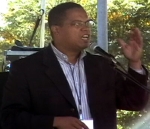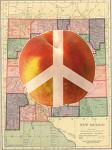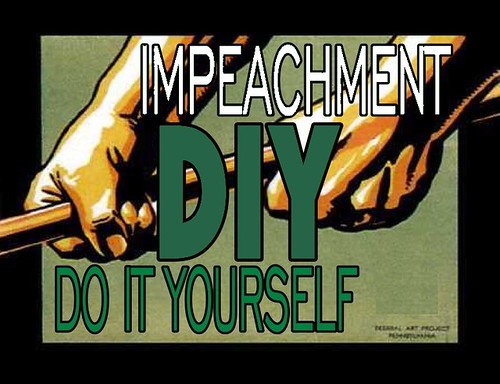| ILLEGAL WAR
The following is a chronological account of the actions of President George W. Bush leading U.S. illegally to war with Iraq.
- Fall, 1999
Before his presidency, Bush reveals his interest in invading Iraq.
Author and journalist Mickey Herskowitz recounts Bush's comment that: "One of the keys to being seen as a great leader is to be seen as a commander-in-chief... My father had all this political capital built up when he drove the Iraqis out of Kuwait and he wasted it... If I have a chance to invade, if I had that much capital, I'm not going to waste it." Herskowitz states that "Bush expressed frustration in a lifetime as an underachiever in the shadow of an accomplished father. In aggressive military action, he saw the opportunity to emerge from his father's shadow," (Russ Barker, GNN.tv, October 28, 2004).
- Early 2001
CIA informes the Bush administration that the "aluminum tubes," later to be used as evidence of a nuclear WMD program, were probably not intended for that purpose.
In the article, CIA officials and a senior administration official tell us that Rice's staff had been told in 2001 that Energy Department experts believed the tubes were most likely intended for small artillery rockets, and not a nuclear program. (New York Times, Octbober 3, 2004)
- March, 2002
Despite his later claims that he had not yet decided to attack Iraq, Bush indicates his intention to do so.
Bush states to National Security Advisor Condoleezza Rice and three U.S. Senators: "Fuck Saddam. We're taking him out," (Time Magazine, March 24, 2003).
- March, 2002
Prior to Congress' October 11th authorization of the Iraq invasion, Bush initiates war in Iraq's No Fly Zone.
Bush ordered the tonnage of bombs being dropped on Iraq from 0 in March 2002 and 0.3 in April 2002 to between 7 and 14 tons per month in May-August, reaching a pre-war peak of 54.6 tons in September (New Statesman, May 30, 2005).
The UN established No Fly Zones in 1991 (in UN resolution 688) and 1992. Accordingly, it is illegal for the allied pilots (U.K. & U.S.) to bomb within the NFZs except to prevent humanitarian crises between the Sunis and the Shias or in self-defense. To constitute self-defense, "there must be more than 'a threat'. There has to be an armed attack, actual or imminent. The development of posession of nuclear weapons does not in itself amount to an armed attack; what would be needed would be clear evidence of an imminent attack" (Declassified British Foreign Office legal advice: March 2002).
- July 23, 2002
During a meeting of top U.S. and U.K. officials regarding a possible attack on Iraq, foreign policy aide Matthew Rycroft makes the following observations about Bush's comments (Declassified U.K. Downing Street Documents: March 8 - July 23, 2002). - "It seemed clear that Bush had made up his mind to take military action, even if the timing was not yet decided."
- "There was a perceptible shift in attitude. Military action was now seen as inevitable. Bush wanted to remove Saddam, through military action, justified by the conjunction of terrorism and WMD. But the intelligence and facts were being fixed around the policy. The NSC had no patience with the UN route, and no enthusiasm for publishing material on the Iraqi regime's record. There was little discussion in Washington of the aftermath after military action."
- “Bush had made up his mind to take military action, even if the timing was not yet decided. But the case was thin. Saddam was not threatening his neighbours, and his WMD capability was less than that of Libya, North Korea or Iran.
- In reference to illegal bombings begun in May: "The Defence Secretary said that the US had already begun "spikes of activity" to put pressure on the regime."
- “There was little discussion in Washington of the aftermath after military action.”
- “The NSC had no patience with the UN route, and no enthusiasm for publishing material on the Iraqi regime's record.”
- “No decisions had been taken, but he thought the most likely timing in US minds for military action to begin was January, with the timeline beginning 30 days before the US Congressional elections.”
- August 10, 2002
Bush claims publicly that he has no imminent war plan or timetable for war with Iraq, despite clear indications to the contrary in the Downing Street memo and despite having previously initiated bombing in the NFZs (Transcript, Ridgewood Country Club in Waco, TX).
- September 19, 2002
President Bush sends the Iraq Resolution to Congress requesting authorization to use military force against Iraq (White House Video & Transcript).
- October 16, 2002
Congress grants authorization to go to war with Iraq in order to "enforce all relevant United Nations Security Council resolutions regarding Iraq," or to "defend the national security of the United States against the continuing threat posed by Iraq." Subsequently, Bush failed to meet either of these conditions for war.(Congress' Authorization to go to War)
- February 2002 - January 28, 2003
Numerous sources advising the Bush Administration debunk allegations that Niger sold "yellow-cake" uranium, used in the construction of WMDs, to Iraq. However, in Bush's subsequent State of the Union Address to Congress, he claims that the sale did occur. Misleading Congress is a crime.(CNN, March 14th, 2003)
- February 2002
Cheney requests that the uranium sales story be investigated, and Ambassador Wilson is sent to Niger to do so. (New York Times, July 6, 2003)
- February 2002
Ambassador Owens-Kirkpatrick informs Wilson that she had already informed Washington that the allegations of uranium sales to Iraq were false. (New York Times, July 6, 2003)
- March 9th, 2002
Wilson's report is given to the White House. The report concludes there was no evidence that the uranium sale had occurred, and that it would be extremely unlikely for it to have taken place. (Time, Jul. 21, 2003)
- Early October, 2002
CIA Director George Tenet argues “to White House officials, including Deputy National Security Adviser Stephen Hadley,” that the Nigerian uranium claim should not be included in Bush's October 7th speech because the allegation is based on only one source. (WashingtonPost & Truthout.org, July 23, 2003)
- Fall, 2002
The former head of CIA covert operations in Europe and a 26-year veteran of the agency, Tyler Drumheller, states that the allegations did not hold together. According to Drumheller, the CIA informed the White House that "the Africa story is overblown" and "the evidence is weak.'" Drumheller also reports that the Bush Administration had intelligence from Saddam Hussein's inner circle indicating that Iraq "had no active weapons of mass destruction program." Bush's speech writers took the uranium reference out of the October 7th speech (CBS, April 23, 2006), though they would add it back in to subsequent speeches.
- December, 2002
Director General of the IAEA Mohamed ElBaradei sends a letter to the White House and the National Security Council warning senior officials that he believes the documents were forgeries and should not be cited by the administration as evidence that Iraq was actively trying to obtain WMDs. ElBaradei receives no written response to his letter, despite repeated follow-up calls he makes to the White House, the NSC and the State Department (Couterbias, January 27, 2006).
- January 12, 2003
The State Department's Bureau of Intelligence and Research expresses "concerns to the CIA that the documents pertaining to the Iraq-Niger deal were forgeries" and notes that it may already have informed intelligence agencies of this (Declassified State Department Memo to the Undersecretary).
- January 17, 2003
The State Department tells the CIA that the intelligence reports upon which the uranium claims were based were forgeries (Declassified State Department Memo to the Undersecretary).
- January 28, 2003
Despite having been informed numerous times to the contrary, Bush claims in his State of the Union Address to Congress that "the British Government has learned that Saddam Hussein recently sought significant quantities of uranium from Africa" (White House Video & Transcript).
- January 28, 2003
Bush misleads congress about chemicle WMDs
Bush claims in his State of the Union address to Congress that Iraq is pursuing and has vast stockpiles of checmical weapons. In this speech, he leaves out key words used by his intelligence agency which modify the assertions he puts forth. These modifications would have cast doubt on his assertions, and the removal of these modifyers amounts to misleading congress. An analysis of these changes to the intelligence reports was made by John W. Dean, a FindLaw columnist, and a former counsel to the President. (FindLaw, July 18, 2003)
- January 31, 2003
The New York Times and The Guardian reports that a secret memo reveals that President Bush and Prime Minister Blair agreed to invade Iraq even without U.N. backing (NYTimes, March 27, 2006; The Guardian, Feb. 3rd, 2006):
- "Mr Bush made it clear the US intended to invade whether or not there was a second UN resolution and even if UN inspectors found no evidence of a banned Iraqi weapons programme."
- "The diplomatic strategy had to be arranged around the military planning", Bush told Blair.
- The memo is also said to reveal that President Bush suggested "flying U2 reconnaissance aircraft planes with fighter cover over Iraq, painted in UN colours," in order to provoke Saddam to shoot on them, therefore putting Iraq in breach of United Nations resolutions.
- March 6, 2003
Bush indicates he hasn't decided to take military action, and is open to a peaceful resolution.
"I've not made up our mind about military action. [sic] Hopefully, this can be done peacefully...” (George W. Bush, White House Press Conference White House Video & Transcript)
- March 7, 2003
United Nations Chief Weapons Inspector (Hans Blix) report on WMDs. Shows Iraq was cooperating with weapons inspectors, and presence of WMDs could not be confirmed. Inspector indicated more time was needed as Iraq was becoming increasingly forthcoming, and much progress was being made. A prediction of months (not weeks or years) was needed. Bush is to later pull these inspectors from Iraq and claim Saddam "wouldn't let them in." (CNN, March 7, 2003)
- March 8, 2003
Bush indicates he is attempting to avoid war with Iraq:
“We are doing everything we can to avoid war in Iraq.” (George W. Bush Radio Address, White House Video & Transcript)
- March 17, 2003
Bush advises U.N. weapons inspectors to leave Iraq Immediately. (Address to Nation, White House Video & Transcript)
- March 17, 2003
Bush indicating publically, a willingness to work with the United Nations and respect it's mission:
"America tried to work with the United Nations to address this threat because we wanted to resolve the issue peacefully. We believe in the mission of the United Nations." (George W. Bush, in Address to the Nation, White House Video & Transcript)
- March 18, 2003
Bush Letter to Congress prior to revealing the ongoing war:
"[A]cting pursuant to the Constitution and [the Authorization for Use of Military Force Against Iraq Resolution of 2002] is consistent with the United States and other countries continuing to take the necessary actions against international terrorists and terrorist organizations, including those nations, organizations, or persons who planned, authorized, committed, or aided the terrorist attacks that occurred on September 11, 2001." (White House, March, 2003)
- March 19, 2003
Bush reveals ongoing war with Iraq and increases intensity. War announced despite Iraq not having been shown to be a threat to the U.S., and without a resolution from the U.N. Security Council. These conditions were required by Congress' authorization to go to war. (White House Video & Transcript)
- July 14, 2003
Bush lying to public about his confidence about WMDs and the status of weapons inspectors prior to the war:
"The larger point is, and the fundamental question is, did Saddam Hussein have a weapons program? And the answer is, absolutely. And we gave him a chance to allow the inspectors in, and he wouldn't let them in. And, therefore, after a reasonable request, we decided to remove him from power, along with other nations, so as to make sure he was not a threat to the United States and our friends and allies in the region..." (George W. Bush, Photo Op in the Oval Office, White House Video & Transcript)
- September 17, 2003
This shows that Bush knew about the lack of connection between Iraq and 9/11, a connection he implied existed in his letter to Congress.
"We have no evidence that Saddam Hussein was involved with the Sept. 11." (White House Transcript and Video)
- July 29, 2004
(Declassified CIA-commissioned report on pre-war intelligence)
- "Some in the Intelligence Community and elsewhere hold the view that intense policymaker demands in the run-up to the war constituted inappropriate pressure on intelligence analysts."
- "Despite the pressure, however, the Intelligence Community remained firm in its assessment that no operational or collaborative relationship existed [between Iraq and al-Qa'ida]. In the case of Iraq's possession of WMD, on the other hand, analytic judgments and policy views were in accord, so that the impact of pressure, if any, was more nuanced and may have been considered reinforcing."
|


 Patriots for Corporate Rights invites you to join up with other concerned citizens on Friday, February 9th, between 4:00 and 7:00 p.m. We will gather in Minneapolis at Lagoon & Hennepin, Uptown (in front of the library), to celebrate our nation’s willingness to go to war and to torture people in order to preserve freedom here and abroad.
Patriots for Corporate Rights invites you to join up with other concerned citizens on Friday, February 9th, between 4:00 and 7:00 p.m. We will gather in Minneapolis at Lagoon & Hennepin, Uptown (in front of the library), to celebrate our nation’s willingness to go to war and to torture people in order to preserve freedom here and abroad.  The following rally is a tactic. The idea is to get people to wake up and see the ridiculousness of supporting war and torture, which is what they are inadvertently doing by being complacent. It becomes harder to put the fact that our nation is actually torturing people out of your mind when there are people standing up in defense of the right to do it. And if the population isn't outraged when they see us, media reports on the lack of that outrage can be an effective way of getting our message across as well.
The following rally is a tactic. The idea is to get people to wake up and see the ridiculousness of supporting war and torture, which is what they are inadvertently doing by being complacent. It becomes harder to put the fact that our nation is actually torturing people out of your mind when there are people standing up in defense of the right to do it. And if the population isn't outraged when they see us, media reports on the lack of that outrage can be an effective way of getting our message across as well.  We’re betting that signs like “Dissent is unpatriotic,” "3,000 Soldiers is worth it" and “War is good for business” will show the true colors of Bush and his supporters. This kind of dissent is in the tradition of groups like The Yes Men (
We’re betting that signs like “Dissent is unpatriotic,” "3,000 Soldiers is worth it" and “War is good for business” will show the true colors of Bush and his supporters. This kind of dissent is in the tradition of groups like The Yes Men (
 Here is Audio of Keith Ellison (who is currently serving as the first Muslim member of the U.S. House of Representatives) calling for Bush's Impeachment in no uncertain terms at an Impeach for Peace event.
Here is Audio of Keith Ellison (who is currently serving as the first Muslim member of the U.S. House of Representatives) calling for Bush's Impeachment in no uncertain terms at an Impeach for Peace event. NYT: 'Newly revealed orders' issued by Bush show US opened front against Iran in Iraq
NYT: 'Newly revealed orders' issued by Bush show US opened front against Iran in Iraq  On Jan. 7th, the office of New Mexico State Senator Jerry Ortiz y Pino contacted IFP in order to consult us on some of the deeper aspects of the process of impeachment in an effort to start the resolution process in their State. We sent them information regarding historical precedent, the rules of the U.S. House of Representatives, and a copy of another State's draft resolution, and let them know we would offer any additional support they need. Then, on Jan. 12th the news broke that Senator Ortiz was pursuing the legislation. We certainly hope the information IFP provided helped in encouraging the Senator, and will continue to supply any addtional support we can. We also encourage any other State representative to contact IFP regarding any possible future impeachment resolutions. Congratulations New Mexico!
On Jan. 7th, the office of New Mexico State Senator Jerry Ortiz y Pino contacted IFP in order to consult us on some of the deeper aspects of the process of impeachment in an effort to start the resolution process in their State. We sent them information regarding historical precedent, the rules of the U.S. House of Representatives, and a copy of another State's draft resolution, and let them know we would offer any additional support they need. Then, on Jan. 12th the news broke that Senator Ortiz was pursuing the legislation. We certainly hope the information IFP provided helped in encouraging the Senator, and will continue to supply any addtional support we can. We also encourage any other State representative to contact IFP regarding any possible future impeachment resolutions. Congratulations New Mexico!